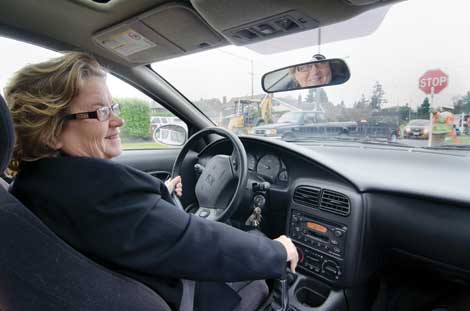Most people depend on their shoes to help them get around comfortably and safely—so would they wear ones that didn’t fit? Not likely. We may not think of ourselves as “wearing†our cars, but the same idea of “fit†applies—and there are adjustments we can make to improve our driving comfort and safety.
A free, national program called CarFit can help you make adjustments in your car that will maintain the vehicle’s safety and operability. Sponsored by AARP, AAA, the American Society on Aging, and the American Occupational Therapy Association (AOTA), the program helps keep older drivers behind the wheel longer (www.car-fit.org).
Mature drivers are more physically fragile and are more likely to be seriously injured or killed if an accident occurs. While older adults tend to be among the safest drivers, changes to aging bodies can put us in jeopardy. By assessing seat depth or height, head-rest positioning, and rearview or side mirror positioning, a CarFit assessment can help to considerably increase comfort, function, and the safety of a driver and their passengers.
Last year, the CarFit event offered by the School of Occupational Therapy at University of Puget Sound helped 25 drivers tailor their personal fit within their vehicles. Participants said it was valuable to learn how to modify the mirror for improved viewing, how to position their seat to prevent unnecessary air-bag trauma, and how to make adaptations to improve their ability to get in and out of the vehicle.
This year, a CarFit event will be held at UPS on Oct. 7 from 10 a.m. to 2 p.m. Students in the final year of the university’s occupational therapy master’s program, a professor and a certified driving rehabilitation specialist will take you on a tour of your car’s features and give you tips on how to adjust them to fit your individual needs.
Why are occupational therapy students involved? Occupational therapists work in a variety of settings, including schools, hospitals, and people’s own homes, with the common goal of helping people do their day-to-day activities in the safest and most effective way. The Puget Sound faculty and students see the free CarFit program as an opportunity to contribute to the local community. CarFit participants, in turn, provide the students with “hands-on†experience in one of the many skills they will need in their future careers as occupational therapists.
The free CarFit event will be held at the William T. and Gail T. Weyerhaeuser Center for Health Sciences (located at the corner of North 11th Street and North Lawrence Street in Tacoma). Each evaluation will take about 20 minutes. Participants may make a reservation for a specific time or just show up with their vehicle.
To make a reservation or for further information, contact Lucretia Berg at (253) 879-1565 or at lberg@pugetsound.edu.

This article was written by Lucretia Berg, who is a visiting clinical assistant professor of occupational therapy at University of Puget Sound, and Michelle Gangi and Kjirsten Winters, who are students in the program.